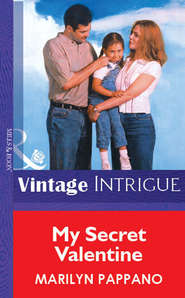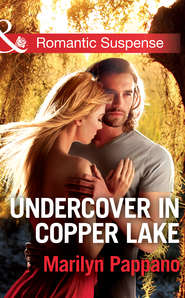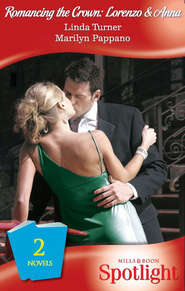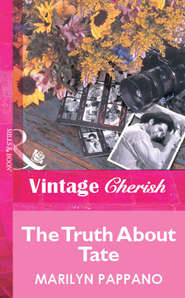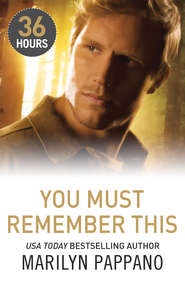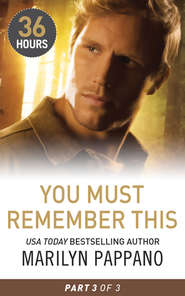По всем вопросам обращайтесь на: info@litportal.ru
(©) 2003-2025.
✖
The Trouble with Josh
Автор
Год написания книги
2018
Настройки чтения
Размер шрифта
Высота строк
Поля
Candace’s gaze slid past Natalie. The other cowboy, the one who’d worked alongside the dog while the flirt flirted, came to join them, carrying a small child. Though the boy’s hair was auburn, there was no denying the resemblance between him and the man, which suggested he was Natalie’s cowboy, which meant the other wasn’t. It was a selfish thing to consider at the moment, but Candace couldn’t help it. She was relieved.
The second man slid his free arm around Natalie’s waist and hugged her close. “What’s going on, babe?”
Pale and steely-eyed, Natalie replied, “Nothing. She was just leaving.”
Candace cleared her throat. “Natalie, please… I don’t blame you for not wanting to talk to me, but please, just listen to what I came to say.”
“Listen to you lie, twist the facts and manipulate the details? I don’t think so.”
She started to close the door again, and Candace blurted out, “I just wanted to tell you how sorry I am—”
The door closed with a quiet click.
Candace stood there a long time, staring at the door. She wanted to ring the bell again and apologize for disturbing them. She wanted to climb in her car and drive as far away and as fast as she could. She wanted to beg for just a moment of Natalie’s time.
When her lungs began to burn, she finally remembered to breathe, a quick soft gasp that sounded unnervingly close to a sob. Of course it wasn’t. Candace Thompson was tough, ambitious, self-centered. She didn’t cry. She made other people do it. She had cried only twice that she could recall in the past thirty years, the first when she’d thought she was going to die the way she’d lived—alone and unloved—the second, soon after. She hadn’t been able to name a single soul who would mourn her passing, and that had sent her into mourning.
Once she forced her feet to move, she hurried down the steps, then covered the ground to the car in a dozen long strides. She didn’t glance at the house as she backed around an ancient oak, then headed down the driveway. She didn’t wonder if they watched through the blinds with relief that she was leaving.
By the time she’d reached the intersection with the first paved highway, her breathing was relatively normal. She forced her jaw to relax, then eased her two-fisted grip on the steering wheel. She’d tried and failed. End of story, right? So she could mark that goal off her list and go on to the dozens of goals that remained. Right?
Right.
With an overwhelming relief rushing over her, she checked for traffic, then pulled onto the highway. She didn’t intend to waste any time. She would contact the accommodating rental car guy and make arrangements to turn in the car this afternoon, get the RV ready and hit the road first thing in the morning. She had places to go and things to do. She had a life to live. She’d wasted most of the thirty-eight years she’d been given, but she intended to make the next thirty-eight—or however many she had left—worthwhile.
The two-lane highway led her east into Hickory Bluff. The smallest place she’d ever lived had more than 175,000 residents. She wasn’t sure if Hickory Bluff appealed to her in spite of that, or because of it. According to the sign on the edge of town, it was home to 990 two-legged residents, and probably twenty times that of the big, shaggy four-legged variety.
Nothing about the place was fancy. The buildings downtown were built mostly of native stone, and the houses on the blocks extending out from downtown were plain and functional. Most had porches, even the trailers, which weren’t gathered in a mobile home park as she’d come to expect, but were mixed in with the more permanent structures.
High school athletics seemed to be an important part of the community. The water tower was painted green and gold, with the legend Go, Wildcats! Store windows bore hand-painted cheers, pennants or bumper stickers, and a disproportionate number of the people she’d seen wore green ball caps with the Hickory Bluff High School initials embroidered in gold.
It was a rather shabby, worn, homey town, and if she were staying, she would probably be tempted to write an article about just how homey. If she were still writing.
Once she turned onto the main street, she intended to drive straight through town and to the campground. Instead, she found herself pulling into a parking space in front of Merrill’s, a store that could provide you with a driver’s license to drive to the lake, a fishing license to use while you were there, beer and sandwiches for a late lunch and ice to keep them cold. Through the window she could also see a selection of fussily hand-painted T-shirts, a display of plastic Halloween lawn ornaments and stacked-up cases of motor oil, supporting videotapes for rent. At first glance, it seemed an odd combination of goods and services, but she could remember a time when it would have met every one of her father’s needs, especially the beer.
It was hunger that had made her stop—she’d been too nervous to eat breakfast that morning—along with the desire to avoid one more solitary meal. She’d had enough of those in the past eleven months to last a lifetime.
Norma Sue’s Café was in the middle of the block and was one of only three places to eat in town. The others were the Dairy Delight, great for burgers, according to the obviously some-sort-of-relative-to-Natalie’s-husband charmer, and Pepe Chen’s Mexican and Chinese Buffet, an experience she thought she might be better off skipping.
A cowbell jangled over the café door when she went inside. A few people glanced up, and the waitress behind the counter called, “Have a seat wherever,” but that was the extent of attention. She’d expected a few more curious glances but was grateful to be wrong. She wanted to be with other people, but she didn’t necessarily want their attention. Just seeing other faces, hearing other voices, would be enough.
She’d barely settled in an empty booth when the waitress brought her iced water and a menu. She ordered a chicken salad sandwich and pop, then eyed the mile-high meringues on the pies that filled a display cabinet on the counter. She could turn down candy, ice cream and cake, but a good pie would undermine her best intentions every time. Natalie had once suggested that it was because she associated pies with easier, more innocent times—growing up, holidays, family closeness.
Candace hadn’t told her there’d been nothing easy or innocent about her childhood. There had certainly been no family closeness.
Thinking of Natalie stirred an ache in her chest. She’d known all along what the outcome of this trip would be—had known the odds against her succeeding were overwhelming. Still, someplace deep inside, she’d hoped….
If she left Hickory Bluff tomorrow, there could be no more hope.
Listlessly she pulled the legal pad from her bag. It was wrinkled, torn and stained, but the writing was still legible. To be on the safe side, she’d copied its contents into her journal, but there was something satisfying about this original with its stains, tears and doodles. That neatly written list on heavyweight pristine journal paper could well be nothing more than a someday dream, while this one was being made real, slowly but surely.
But not by giving up after one lousy failure.
She was staring at that failure—Make amends with Natalie—when a shadow fell across the paper. Expecting the waitress, she looked up with a faint smile. Seeing the handsome cowboy, she let it fade.
Without waiting for an invitation, he sat down across from her and leaned forward. “I don’t know what the hell you think you’re doing, but you’re not welcome here,” he said in a low, cold voice. It was an amazing change—from the appreciative looks, the lazy drawl and the easy charm to this cold, hard hostility. And he didn’t even know her. Just think how much he could hate her if he did.
“What I’m doing is none of your business,” she said, making an enormous effort to keep her voice as well as her hands steady as she turned the legal pad facedown.
“The hell it isn’t! No one comes around here making trouble for my family without making it my business.”
“I’m not making trouble.”
“Natalie says you are. She says you’re a liar, that you’d backstab your own mother to get ahead. She says you’re dishonest, unethical and untrustworthy and that she wishes she’d never met you.”
Candace stared hard at the tabletop to stop the moisture trying to well in her eyes. No surprises there. She’d known of all the challenges and goals she’d set for herself, this would be the most impossible. Natalie wasn’t inclined to feel an ounce of forgiveness, and understandably so. If Candace were in her place, she wouldn’t feel very forgiving, either. But if she could just find it in her heart to listen—not forgive, not forget, just listen….
“Do us all a favor and get the hell out of town. If you set foot on the ranch again, we’ll have you arrested, and if you go near Natalie again, I swear to God, I’ll make you damn sorry.” He delivered his warning in a voice so fierce, with such force behind it, that she had little doubt he meant every word of it. Then he slid to his feet, almost bumping into the waitress.
“Hey, Josh, can I get you—” The waitress broke off, perplexed, to watch him walk away, then slowly shifted her suspicious gaze to Candace. Making no effort to be friendly, the woman set the dishes down with a thud, sloshing pop onto the cardboard back of the legal pad, then walked away.
So was that the kind of influence the Rawlins family held in Hickory Bluff? Candace wondered wearily as she stared at a chicken salad sandwich big enough for three. Their enemies were the town’s enemies? Was the waitress’s loyalty to Josh in particular, or was the entire town likely to turn against Candace if she stayed?
She was feeling perverse enough to find out.
Chapter Two
Supper at the Rawlinses’ house that evening was an unusually somber affair. Natalie was withdrawn, Tate concerned about her, and Josh…. Truth was, Josh was pretty much in the dark. He didn’t know exactly who Candace Thompson was—someone Natalie had once been friends with, whom she now despised, whose name couldn’t even be mentioned at the table without stony silences or, worse, an awful hurt look sliding over Natalie’s features.
But, bottom line, Josh didn’t need to know any details. Rawlinses stuck together. It was how they got through the bad times, and it made the good times that much better. He didn’t need to know what Candace had done. Natalie was family, and her enemy was the family’s enemy.
Too bad her enemy was so damn pretty.
He finished the supper dishes he’d volunteered to wash and dried his hands, then went into the living room. Tate was sitting on the couch, J.T. snoozing on his lap and Natalie curled up against him. She looked as if she were a thousand miles away, in a place too melancholy to bear.
“I…I guess I’ll head on home,” he said.
“See you in the morning,” Tate responded.
Moving closer, Josh gently ruffled J.T.’s hair, then squeezed Natalie’s hand. She didn’t lift her head from Tate’s shoulder but gave him a sad smile.
The night was chilly, making him glad he’d brought a jacket. The sky was dark and clear, the stars so bright that it seemed he could reach up and touch them. He whistled tunelessly as he crossed to his pickup, then headed home. He lived on the south end of the property, a half mile west of the road in a stand of timber. He and Tate had built the house themselves eight years ago, working in their free time. They’d had precious little of it, so the place was plain and purely functional, which suited him just fine. He didn’t spend much time there, and if he ever married and had kids, he would have to build on. Any prettying-up could be done then.
The road that ran between the two houses was little more than two ruts in the grass. Just before it entered the trees, another narrow lane angled off to the left, giving him quick access to the county road through a rickety gate. The main road went straight, then zigzagged through the trees before finally reaching the clearing where the house stood. It was a simple frame house, painted a dark rusty red. The front porch stood only a foot off the ground, so he hadn’t bothered with railings, and he generally ignored the steps centered in front. He parked at the side, stepped directly up onto the porch, then went in.
The place always seemed so quiet compared to Tate’s house—though this evening next door had been an exception. Of course, having a three-year-old in residence made a hell of a difference. It was nice to walk into Tate’s and hear laughter, chattering and singing, to smell scents like food cooking, perfume and other feminine things, to see childish and womanly touches all over.
Just as it was nice to come in here and find the quiet and privacy he expected.






